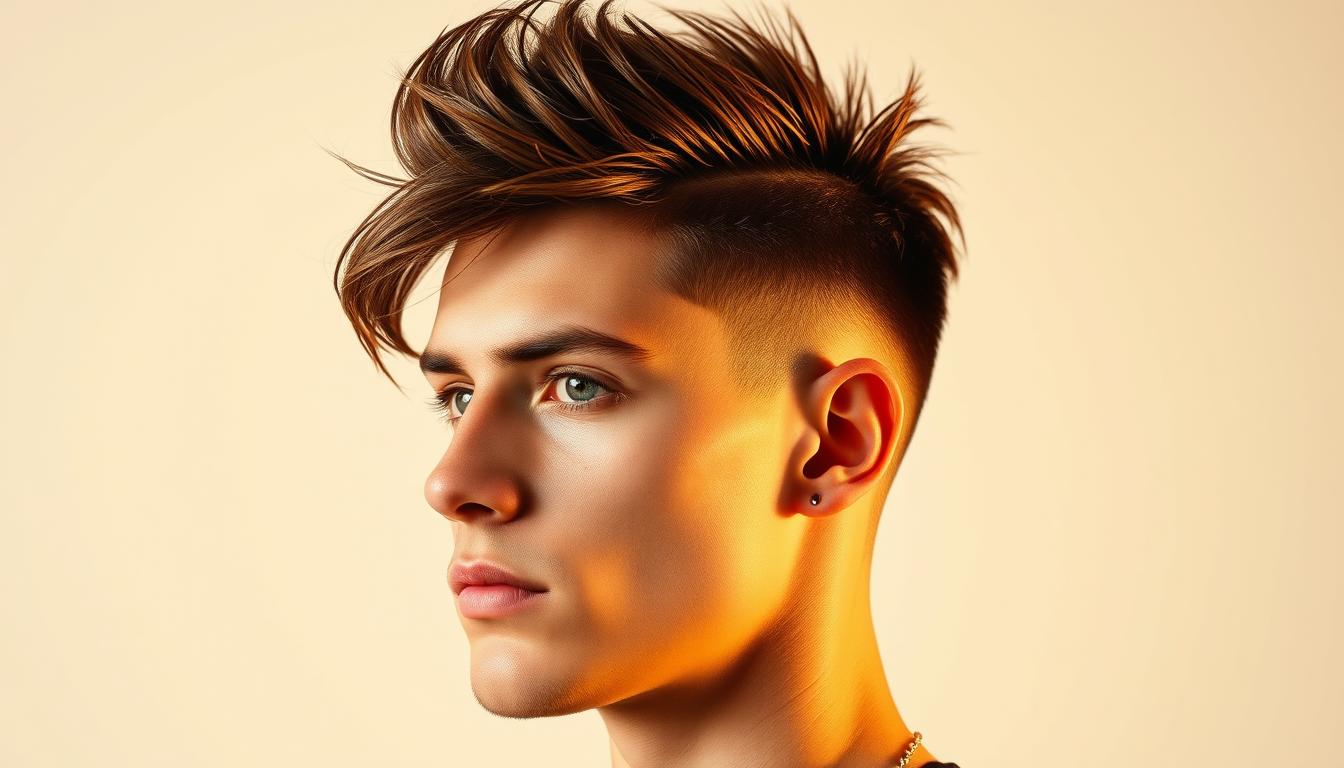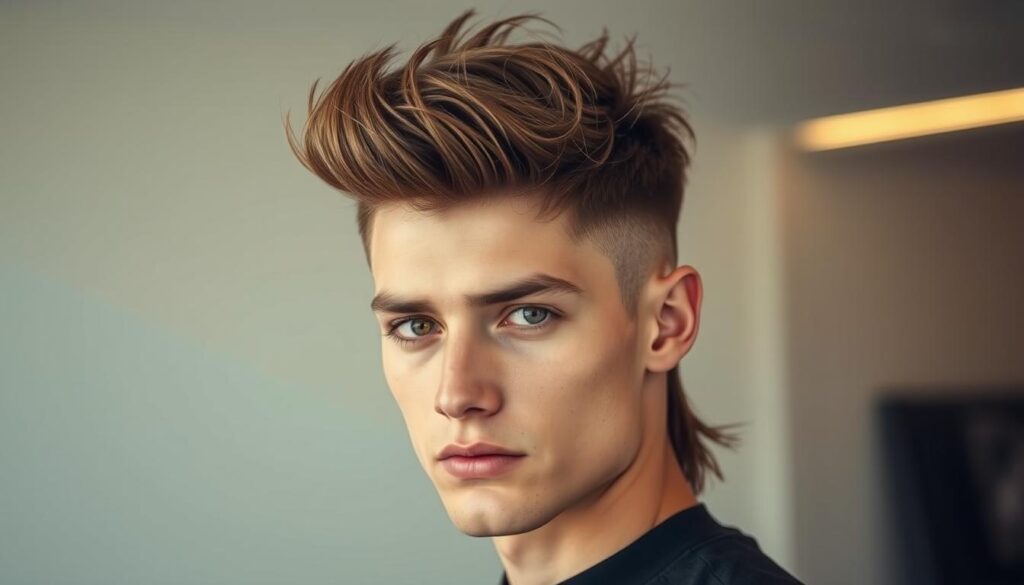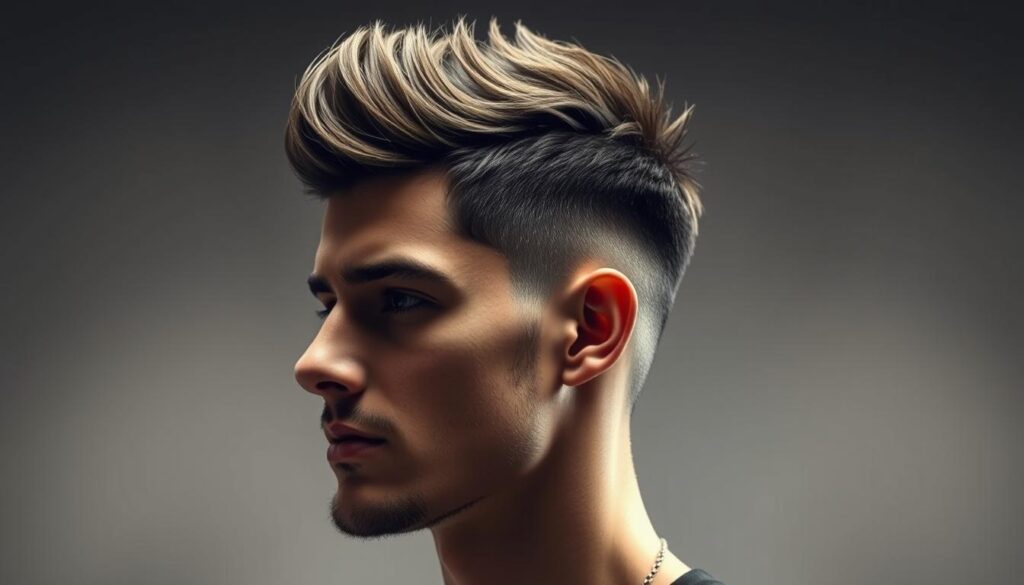
What if a hairstyle could make you look polished yet rebellious at the same time? The answer lies in a daring cut that’s reclaiming its spotlight – blending sharp precision with untamed energy. This isn’t your grandfather’s mullet. Today’s version balances clean lines with creative flair, proving bold choices can thrive in modern settings.
The iconic “business in front, party in back” concept gets a fresh twist through tailored fades and textured layers. Whether your hair is curly, straight, thick, or fine, this look adapts to your natural texture while amplifying your confidence. Celebrities and style influencers have embraced its versatility, pairing it with everything from streetwear to tailored suits.
Why does this cut work now? It merges nostalgia with current barbering trends, offering a customizable canvas. Shorter sides create structure, while longer lengths in the back add movement. The result? A hairstyle that’s equally at home in boardrooms and concert venues when styled intentionally.
Key Takeaways
- Combines sharp fades with longer lengths for balanced edge
- Works with all hair types when customized by skilled barbers
- Easily transitions between professional and casual environments
- Gained popularity through athletes and fashion-forward celebrities
- Requires minimal daily styling for maximum impact
Introduction to the High Fade Mullet Trend

The once-polarizing mullet has reinvented itself for the modern era. No longer just a symbol of 1980s rebellion, today’s version blends sharp barbering techniques with wearable edge. It’s become a go-to for men seeking personality-packed looks that transition effortlessly from day to night.
Defining the High Fade Mullet
This updated cut features graduated sides that start near the temples, creating clean contrast with longer lengths on top and at the back. Skilled barbers use clipper work to shape the silhouette, ensuring the dramatic taper complements your head shape. The result? A hairstyle that commands attention without sacrificing polish.
From Retro Roots to Modern Appeal
Originally popularized by rock stars and athletes decades ago, the mullet’s revival began when Gen Z embraced its nostalgic charm. Modern versions swap wild shaggy layers for intentional texture and structured lines. Celebrities like David Bowie first made it iconic, but today’s influencers wear it with minimalist outfits and groomed beards.
What makes this style work now? It’s all about balance. The new interpretation keeps the original’s bold spirit while adding sophistication through precise cutting methods. Whether you’re hitting the office or a weekend event, this cut adapts to your lifestyle while making a statement.
Why Choose a High Fade Mullet?

Ever wanted a hairstyle that shouts “unapologetically you”? This cut merges rule-breaking energy with everyday wearability. Unlike cookie-cutter styles, it celebrates your natural texture while amplifying your personality.
Your Signature Look Starts Here
Barbers call it “the ultimate confidence booster”. The contrast between cropped sides and flowing lengths creates instant edge. Thick hair gains definition through layered texture, while fine strands appear fuller with strategic tapering. Curly types get bounce without bulk.
Built for Real Life
Morning routines become effortless – a quick tousle with matte paste keeps the look fresh. Creative professionals love its artistic vibe, while corporate workers slick back the top for meetings. One client shared: “It’s like having two haircuts in one – office-ready by day, rockstar by night.”
The psychological perk? Standing out becomes second nature. You’ll notice compliments flowing as freely as your hair’s movement. This cut doesn’t just adapt to your life – it elevates how you move through the world.
Exploring Different Mullet Haircuts
How do you make a bold hairstyle work for your daily life? The secret lies in choosing the right variation. Today’s mullet haircuts offer tailored options that balance personality with practicality, letting you customize the look to match your vibe.
Modern Mullet vs. Classic Mullet
The classic mullet stays true to its roots with a stark contrast – cropped front sections against a dramatically longer back. Think 1980s rockstars with shaggy layers. Modern versions soften this transition, using blended fades and textured ends for a sleeker finish.
Barbers often recommend the updated approach for professional settings. “It keeps the edge without looking costume-y,” says Los Angeles stylist Marco Torres. The modern cut works with natural hair patterns, whether you have waves or pin-straight strands.
Variations: Long, Short, and Textured
Go big with a long mullet that cascades past your shoulders. This version needs thicker hair to maintain shape but makes a striking statement. For low-key days, {{the}} versions keep the signature silhouette with collar-grazing lengths.
Textured cuts add movement through razor-cutting or point-cutting techniques. They’re perfect for curly hair types, creating bounce without bulk. Pair any variation with matte products for grip or shine serums for polished events.
Your ideal choice depends on maintenance tolerance and hair density. Thinner strands? Opt for layered crops. Thick manes? Embrace flowing lengths. Every option celebrates individuality while fitting seamlessly into your routine.
Finding the Right Cut for Your Face Shape
Your face shape holds the key to unlocking your best look. Just like glasses or beards, hairstyles enhance specific features when tailored to your natural proportions. The right balance between cropped sides and flowing lengths can highlight your strongest angles while softening others.
Customizing Your Silhouette
Oval faces hit the style jackpot – nearly every variation works. Try dramatic contrast between tight fades and voluminous backs. For round faces, create vertical lift with textured tops that draw eyes upward. Keep sides neatly tapered to elongate your profile.
Square jawlines shine with softer layers that complement angular features. Ask your barber for blended edges rather than sharp lines. Those with heart-shaped faces should focus volume below the ears to balance wider foreheads.
Diamond face shapes benefit from width at the temples. A fuller back section offsets prominent cheekbones beautifully. “The goal is harmony,” explains Chicago stylist Lena Park. “We adjust lengths and textures to create natural flow.”
- Round faces: Add height with tousled crowns
- Square jaws: Soften with wispy ends
- Heart shapes: Build volume below cheekbones
- Diamond profiles: Expand temple width
Book a consultation with a skilled stylist who understands geometric balance. Bring reference photos, but stay open to their expert adjustments for your unique bone structure.
Styling the High Fade Mullet
Your hairstyle’s success starts with the right prep work. Proper tools and techniques turn this bold cut into a daily head-turner. Let’s break down how to enhance its texture and maintain that effortless edge.
Essential Tools and Products
Grab a blow dryer with a diffuser – it’s your secret weapon for adding volume. A wide-tooth comb detangles without flattening your waves, while texturizing powder gives grip to finer strands. Pro tip: Volumizing shampoo creates lift from the roots, making styling easier.
Step-by-Step Styling Tips
Start by towel-drying your hair until damp. Spritz sea salt spray from mid-lengths to ends, scrunching upward for piecey definition. Use the diffuser on low heat, lifting sections at the crown as you dry.
Work a pea-sized amount of matte clay through your fingers. Rake it through the top and back sections, avoiding the shorter sides. Twist random strands for lived-in texture that lasts all day.
For quick touch-ups, pat texturizing powder at the roots. It absorbs oil while maintaining that “just-styled” look. “The goal is controlled chaos,” says NYC stylist Javier Ruiz. “Let the products enhance your hair’s natural movement.”
Maintaining Your High Fade Mullet Look
Keeping your statement haircut fresh requires smart upkeep strategies. Think of it like caring for a tailored suit – regular attention preserves its sharpness while letting your personality shine through.
Barber Visits Made Simple
Visit your barber every two to three weeks to keep the contrast between cropped sides and flowing lengths crisp. “Growth patterns vary,” notes Miami stylist Elena Rivera. “We adjust the fade’s starting point each visit to maintain clean lines as your hair changes.”
Between appointments, use sulfate-free shampoo to protect color-treated strands. Focus conditioner on the longer back section to prevent split ends. A wide-tooth comb works best for detangling without breaking delicate hairs.
Product Power Moves
Three essentials extend your style’s lifespan:
- Leave-in conditioner: Tames flyaways in longer sections
- Matte texture spray: Adds grip without stiffness
- Scalp serum: Soothes skin after tight fades
For sun protection, mist UV-filter sprays before outdoor activities. Nighttime routines matter too – silk pillowcases reduce friction that causes breakage.
Trending High Fade Mullet Variations
Ready to push your look beyond the basics? Today’s boldest styles reimagine classic shapes with modern edge. These variations let you dial up the drama or keep it subtle – all while staying true to your personal vibe.
Mullet Fade & Spiky Statements
The spiky mullet demands attention. It pairs cropped sides with vertical peaks up top, requiring strong-hold wax and a steady hand. Medium lengths flow seamlessly into the back, creating motion that turns heads.
This version works best with straight or wavy hair. Use a blow dryer and matte paste to lift sections. “It’s not just a haircut – it’s armor,” says barber Tyler Nguyen. Keep sideburns sharp to balance the wilder elements.
Texture Play & Strategic Layers
Want dimension without bulk? Razor-cut layers add movement to thick strands. Curly hair shines with textured mullet hairstyles that enhance natural bounce. Ask for point-cutting along the ends for a lived-in feel.
For fine hair, hidden undercuts create illusionary volume. Stylists often combine multiple techniques – think disconnected fades with feathered tips. The key? Let your hair’s natural pattern guide the design.
